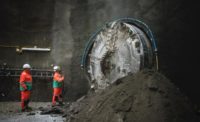Chinese railcar manufacturer CRRC Changchun Railway Vehicles Co. has unveiled a carbon fiber subway car prototype. The company claims the world’s first carbon fiber subway car is more durable and requires less energy than traditional metal cars. Carbon fiber has been used in automobile parts but this may be the first time that the material has been used for subway cars.
The new subway car is 35% lighter, which boasts low operational costs and less wear and tear of the tracks, the company said on the Chinese social media platform WeChat. This is among the innovations that CRRC Changchun, a subsidiary of the train maker CRRC, has delivered in recent months. Another is a specialized electric bus, for the Paris airport. The company began testing China’s first driverless subway train named Dolphin in Beijing on December 30.
CRRC Changchun said it owns full intellectual property rights on the use of carbon fiber for making subway cars. The technological advance it has achieved with in-house research will result in mass production of the cars, it said.
In recent years, CRRC has sold train and subway cars to 20 countries including the U.S., Brazil and Australia. The subway cars are expected to last at least 30 years as carbon fiber is more capable of resisting fatigue, corrosion, and UV radiation, CRRC says. Carbon fiber is also stronger and quieter compared to metal, the manufacturer notes, and offers in better thermal and sound insulation performance.
CRRC’s technology for carbon fiber body involves using composite materials to cope with the structural requirements of rolling stock. The development of the new material also led to exploration in new ways of designing, processing and quality checks. The year 2017 saw CRRC’s contracts rise 30% to $35 billion, according to Morgan Stanley estimates. The company has more than 18,000 employees and annually manufactures more than 8,000 trains.
Last month, the first CRRC-built prototype Orange Line subway car, a conventional metal model, arrived at the Massachusetts Bay Transportation Authority via New Jersey. More cars will be built based on the prototype at the upcoming assembly plant, starting in April.
Testing of the prototype, which arrived by ship from China, will begin at the MBTA's Wellington Yard in Medford, Mass. CRRC is building a $95-million factory at the old Westinghouse site on Page Boulevard in East Springfield to assemble subway cars. It is the largest industrial development to take place in Springfield in years.
The plant’s dimensions are equal to three and a half football fields. With the introduction of new trains, the Orange Line will get a 40% boost in service. There will be a significant increase in frequency with trains arriving at stations every four or four and a half minutes. The pace will be even faster on the Red Line, with trains every three minutes.
In another move, CRRC has introduced its electric bus with a pantograph charging system at a private airport in Paris. C12 is much lighter than traditional buses because it uses “many new materials like the aluminum alloy closing plates and skin plates,” the company said. “With identical electricity quantity in the battery, the weight of the new bus is equivalent to the weight of the vehicles with aluminum alloy car body,” it said.
The company hopes that introduction of the bus, designed to European Union standards, will help CRRC is bagging new contracts in France. What impressed the purchaser, CIE Co.of France, is its low-floor ánd roof-mounted fast-charging pantograph system, which is compatible with the 240kW charging system in Paris. The vehicle also comes with a charging gun, which could be used in off-peak hours, cutting operating costs.
CRRC’s driverless subway linking Yanshan and Fangshan areas of Beijing will be closely watched by both the local government and the railway industry concerned about safety issues in unmanned vehicles. In the initial months, the subway will have a driver supervising the automation facilities and be ready to handle any risky situation. The train has a top speed of 80 km an hour.
Another subsidiary of the company, CRRC Nanjing Puzhen Co. Ltd., started delivering subway trains specially customized for the Noida suburban area, 20 kms from New Delhi, in early November. The contract covers 19 complete vehicles (76 cars). Each train set comprises two motor train units, two trailers, and and four marshalling units and provide for a total passenger capacity of 1,034 persons.
This is the second major purchase order of CRRC Nanjing Puzhen Co., Ltd. in India. It won the contract for Mumbai Metro Line 1 three years back.





Post a comment to this article
Report Abusive Comment